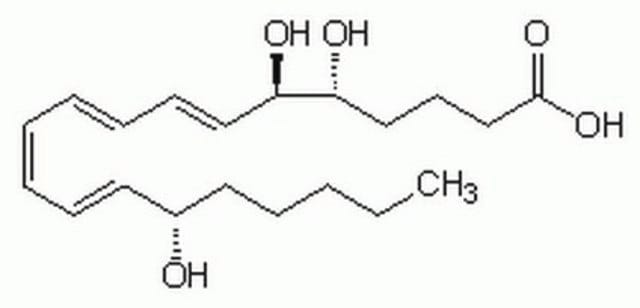H1640
12(S)-Hydroxy-(5Z,8E,10E)-heptadecatrienoic acid
≥93% (HPLC), ethanol solution
Synonym(s):
12(S)-HHT
About This Item
Recommended Products
biological source
synthetic (organic)
Quality Level
Assay
≥93% (HPLC)
form
ethanol solution
functional group
carboxylic acid
shipped in
dry ice
storage temp.
−20°C
SMILES string
CCCCC[C@H](O)\C=C\C=C\C\C=C/CCCC(O)=O
InChI
1S/C17H28O3/c1-2-3-10-13-16(18)14-11-8-6-4-5-7-9-12-15-17(19)20/h5-8,11,14,16,18H,2-4,9-10,12-13,15H2,1H3,(H,19,20)/b7-5-,8-6+,14-11+/t16-/m0/s1
InChI key
KUKJHGXXZWHSBG-WBGSEQOASA-N
Signal Word
Warning
Hazard Statements
Precautionary Statements
Hazard Classifications
Eye Irrit. 2 - Skin Irrit. 2 - STOT SE 3
Target Organs
Respiratory system
Storage Class Code
10 - Combustible liquids
WGK
WGK 3
Flash Point(F)
Not applicable
Flash Point(C)
Not applicable
Personal Protective Equipment
Certificates of Analysis (COA)
Search for Certificates of Analysis (COA) by entering the products Lot/Batch Number. Lot and Batch Numbers can be found on a product’s label following the words ‘Lot’ or ‘Batch’.
Already Own This Product?
Find documentation for the products that you have recently purchased in the Document Library.
Our team of scientists has experience in all areas of research including Life Science, Material Science, Chemical Synthesis, Chromatography, Analytical and many others.
Contact Technical Service








